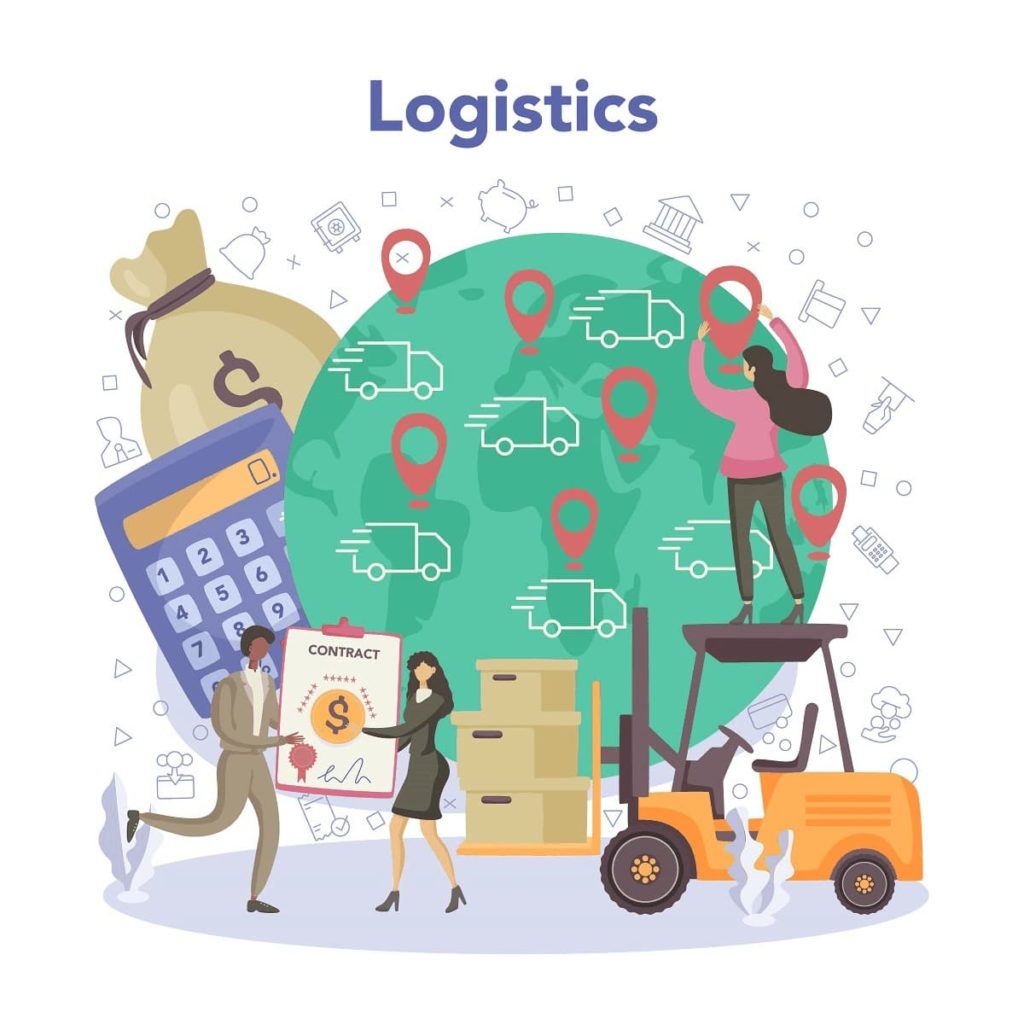Editorial Note: We are an inventory management software provider. While some of our blog posts may highlight features of our own product, we strive to provide unbiased and informative content that benefits all readers.
Logistics management is the process of planning, organizing, and controlling the flow of goods and services from the point of origin to the point of consumption.
It is a critical function for businesses of all sizes, as it can help to improve efficiency, reduce costs, and improve customer satisfaction.
In today’s global economy, logistics management is even more important, as businesses need to be able to efficiently and effectively move goods and services across borders. Some of the challenges of logistics management in a global economy include distance, time, cost, and risk.

Importance of Logistics Management:
Logistics management is important because it helps businesses to:
- Improve efficiency: By streamlining the flow of goods and services, logistics management can help businesses to improve their efficiency and reduce costs.
- Increase customer satisfaction: By ensuring that goods are delivered on time and in the right condition, logistics management can help businesses to improve customer satisfaction.
- Reduce risk: By managing the risks associated with transportation, warehousing, and inventory, logistics management can help businesses to reduce their risk.
- Increase profitability: By improving efficiency, reducing costs, and improving customer satisfaction, logistics management can help businesses to increase their profitability.
In today’s global economy, logistics management is even more important, as businesses need to be able to efficiently and effectively move goods and services across borders. Some of the challenges of logistics management in a global economy include distance, time, cost, and risk.
Impact the Global Economy:
Logistics management impacts the global economy in a number of ways. First, it helps to facilitate trade and commerce. By making it easier and more efficient to move goods and services around the world, logistics management helps to break down barriers to trade and create new opportunities for businesses to grow and expand.
Second, logistics management can help to reduce costs. By streamlining the flow of goods and services, logistics management can help businesses to save money on transportation, warehousing, and inventory costs. This can lead to increased profits for businesses and lower prices for consumers.
Third, logistics management can help to improve efficiency. By ensuring that goods are delivered on time and in the right condition, logistics management can help businesses to improve their customer service and reduce waste. This can lead to increased customer satisfaction and loyalty.
Fourth, logistics management can help to improve sustainability. By using sustainable practices, logistics management can help businesses to reduce their environmental impact. This can lead to a cleaner and healthier planet for everyone.
Overall, logistics management is a critical function that plays an important role in the global economy. By helping to facilitate trade, reduce costs, improve efficiency, and improve sustainability, logistics management can help to create a more prosperous and sustainable world.
Here are some specific examples of how logistics management has impacted the global economy:
- The development of global supply chains has allowed businesses to access new markets and reduce costs. For example, the production of a smartphone typically involves components from dozens of countries around the world. By using logistics management to coordinate the movement of these components, businesses can reduce the cost of production and make their products more affordable for consumers.
- The rise of e-commerce has put a premium on efficient logistics management. E-commerce retailers need to be able to quickly and efficiently deliver goods to customers who are ordering online. By using logistics management to optimize their shipping and delivery processes, e-commerce retailers can improve customer satisfaction and boost sales.
- The increasing importance of sustainability has led businesses to focus on more sustainable logistics practices. For example, some businesses are using renewable energy to power their warehouses and distribution centers. Others are using less packaging to reduce waste. By using sustainable logistics practices, businesses can reduce their environmental impact and improve their bottom line.
Logistics management is a complex and ever-changing field. However, by understanding the key concepts and activities involved, businesses can improve their efficiency, reduce their costs, and improve their customer satisfaction. This can lead to increased profits, improved sustainability, and a more prosperous and sustainable world.
Four Main Functions of Logistics Management:
The four main functions of logistics management are:
- Transportation: This involves selecting the most efficient and cost-effective way to move goods from one location to another.
- Warehousing: This involves storing goods in a safe and secure environment until they are needed.
- Inventory management: This involves tracking the levels of inventory and ensuring that the right amount of goods are available at the right time.
- Order fulfillment: This involves picking, packing, and shipping goods to customers.
Logistics management is a complex and ever-changing field. However, by understanding the key concepts and activities involved, businesses can improve their efficiency, reduce their costs, and improve their customer satisfaction.
Here are some additional details about each of the four main functions of logistics management:
1. Transportation:
Transportation is the process of moving goods from one location to another. There are many different modes of transportation, including air, sea, road, and rail. The best mode of transportation for a particular shipment will depend on a number of factors, including the distance to be traveled, the weight and size of the shipment, and the urgency of the delivery.
2. Warehousing:
Warehousing is the process of storing goods in a safe and secure environment until they are needed. Warehouses can be used to store a variety of goods, including raw materials, finished products, and spare parts. Warehouses can also be used to consolidate shipments, which can help to reduce transportation costs.
3. Inventory management:
Inventory management is the process of tracking the levels of inventory and ensuring that the right amount of goods are available at the right time. Inventory management is important because it can help to reduce costs and improve customer satisfaction. Too much inventory can lead to unnecessary costs, while too little inventory can lead to stockouts and lost sales.
4. Order fulfillment:
Order fulfillment is the process of picking, packing, and shipping goods to customers. Order fulfillment is the final step in the logistics process and it is important to ensure that orders are fulfilled accurately and on time. Order fulfillment can be a complex process, but it is essential for businesses that want to provide a good customer experience.
By understanding the four main functions of logistics management, businesses can improve their efficiency, reduce their costs, and improve their customer satisfaction. This can lead to increased profits, improved sustainability, and a more prosperous and sustainable world.
Challenges of Logistics Management:
The challenges of logistics management in a global economy are many and varied.
Some of the most common challenges include:
- Distance: The distance between the origin and destination of goods can have a significant impact on logistics costs. The longer the distance, the more expensive it is to transport goods.
- Time: The time it takes to transport goods can also be a challenge. Goods that are not delivered on time can lead to lost sales and customer dissatisfaction.
- Cost: The cost of transportation, warehousing, and inventory can be a significant challenge for businesses. Businesses need to find ways to reduce these costs without sacrificing efficiency or customer satisfaction.
- Risk: There are a number of risks associated with logistics, including damage to goods, theft, and delays. Businesses need to take steps to mitigate these risks.
- Regulations: There are a number of regulations that businesses need to comply with when transporting goods across borders. These regulations can add complexity and cost to logistics operations.
Despite these challenges, logistics management is an essential function for businesses that operate in a global economy. By understanding and addressing the challenges of logistics management, businesses can improve their efficiency, reduce their costs, and improve their customer satisfaction.
How to Improve Logistics Management:
Logistics management is the process of planning, organizing, and controlling the flow of goods and services from the point of origin to the point of consumption. It is a critical function for businesses of all sizes, as it can help to improve efficiency, reduce costs, and improve customer satisfaction.
There are a number of ways to improve logistics management. Some of the most effective methods include:
- Using technology: There are a number of software and hardware solutions that can help businesses to improve their logistics management. These solutions can help businesses to track inventory, manage shipments, and optimize their supply chains.
- Collaborate with partners: By working with other businesses, businesses can share resources and expertise, which can help them to improve their logistics management. For example, businesses can partner with third-party logistics providers to handle their transportation and warehousing needs.
- Focus on sustainability: By using sustainable practices, businesses can reduce their environmental impact and improve their bottom line. For example, businesses can use renewable energy to power their warehouses and distribution centers. They can also use less packaging to reduce waste.
Here are some additional tips for improving logistics management:
- Set clear goals and objectives: It is important to have a clear understanding of what you want to achieve with your logistics management. Once you know your goals, you can develop a plan to achieve them.
- Identify your key performance indicators (KPIs): KPIs are metrics that you can use to measure the performance of your logistics management. By tracking your KPIs, you can identify areas where you can improve.
- Regularly review and update your logistics management plan: Your logistics management plan should be a living document that you regularly review and update. This will help you to ensure that your plan is always up-to-date and that it is meeting your needs.
- Invest in training and development: It is important to invest in training and development for your logistics team. This will help them to stay up-to-date on the latest trends and technologies, and it will help them to improve their skills and knowledge.
- Continuously monitor and improve: It is important to continuously monitor and improve your logistics management. This will help you to identify areas where you can improve and to make sure that your logistics management is always meeting your needs.
By following these tips, you can improve your logistics management and achieve your business goals.
Conclusion:
Businesses that are able to effectively manage their logistics operations will be well-positioned to succeed in today’s competitive global economy. By investing in logistics management, businesses can improve their bottom line, increase customer satisfaction, and gain a competitive edge.
Here are some additional thoughts on the importance of logistics management:
- Logistics management can help businesses to reduce costs by optimizing their supply chains.
- Logistics management can help businesses to improve customer satisfaction by ensuring that products are delivered on time and in good condition.
- Logistics management can help businesses to improve their environmental performance by reducing waste and emissions.
Logistics management is a complex and ever-changing field. However, by understanding the importance of logistics management and investing in the right technologies and solutions, businesses can gain a competitive edge in today’s global economy.
Take a Quiz Test - Test Your Skill
Test your inventory management knowledge. Short multiple-choice tests, you may evaluate your comprehension of Inventory Management.
- It helps focus inventory management efforts on the most important inventory items
- It helps reduce the overall cost of inventory
- It helps increase the overall value of inventory
- All of the above
